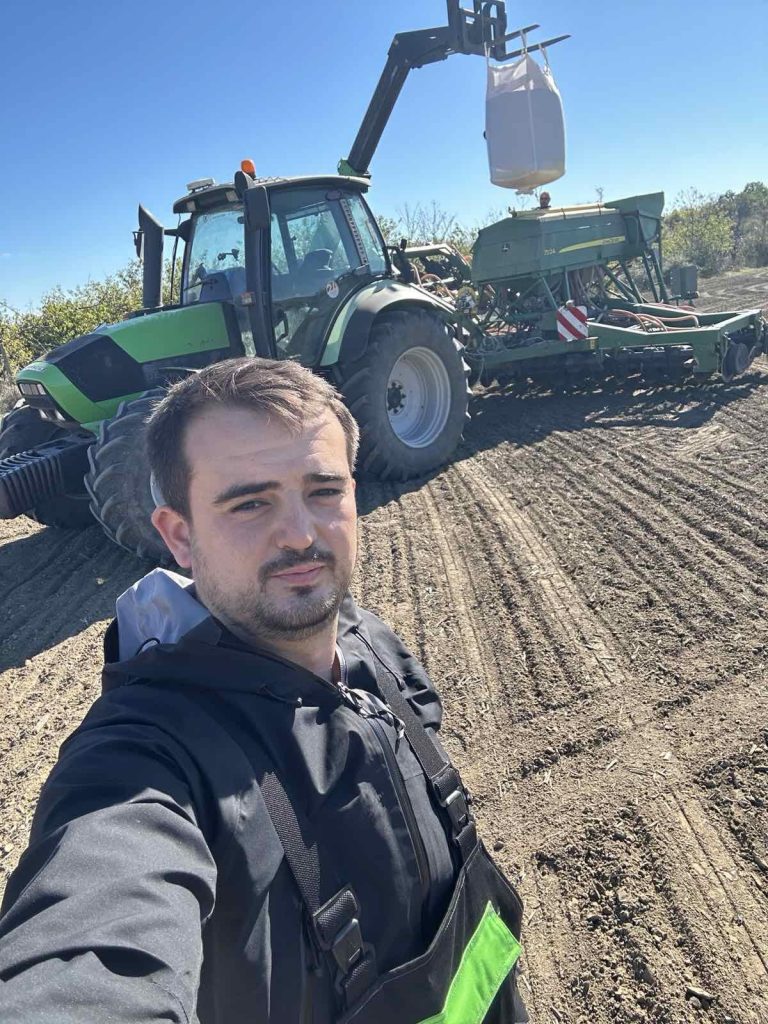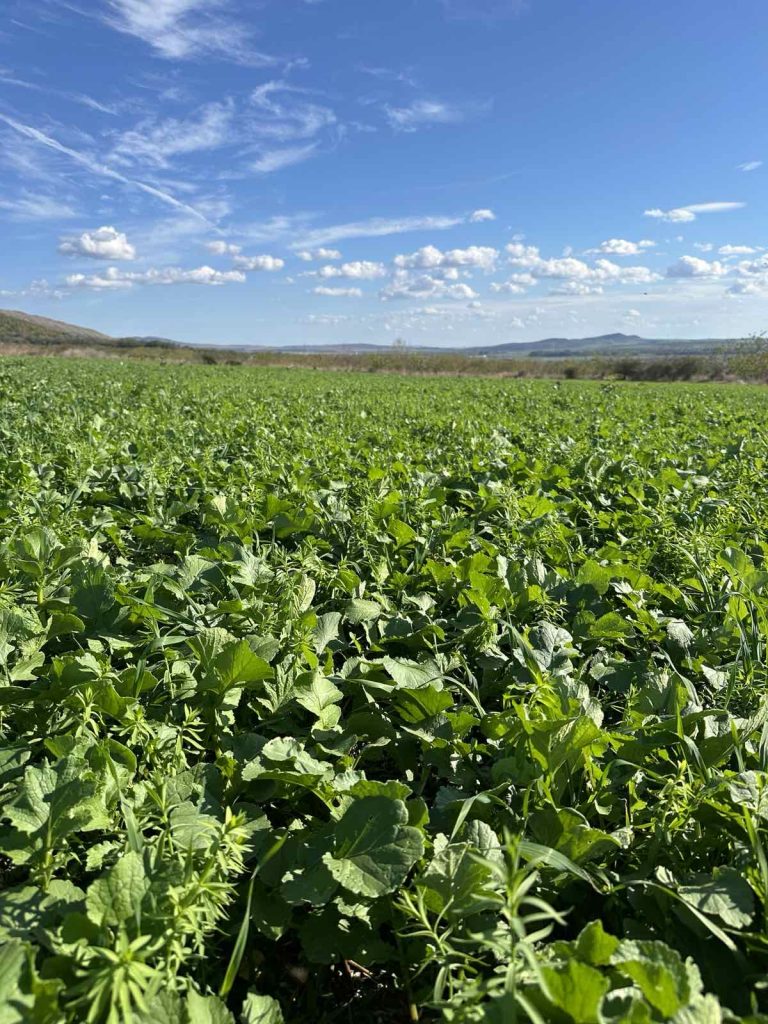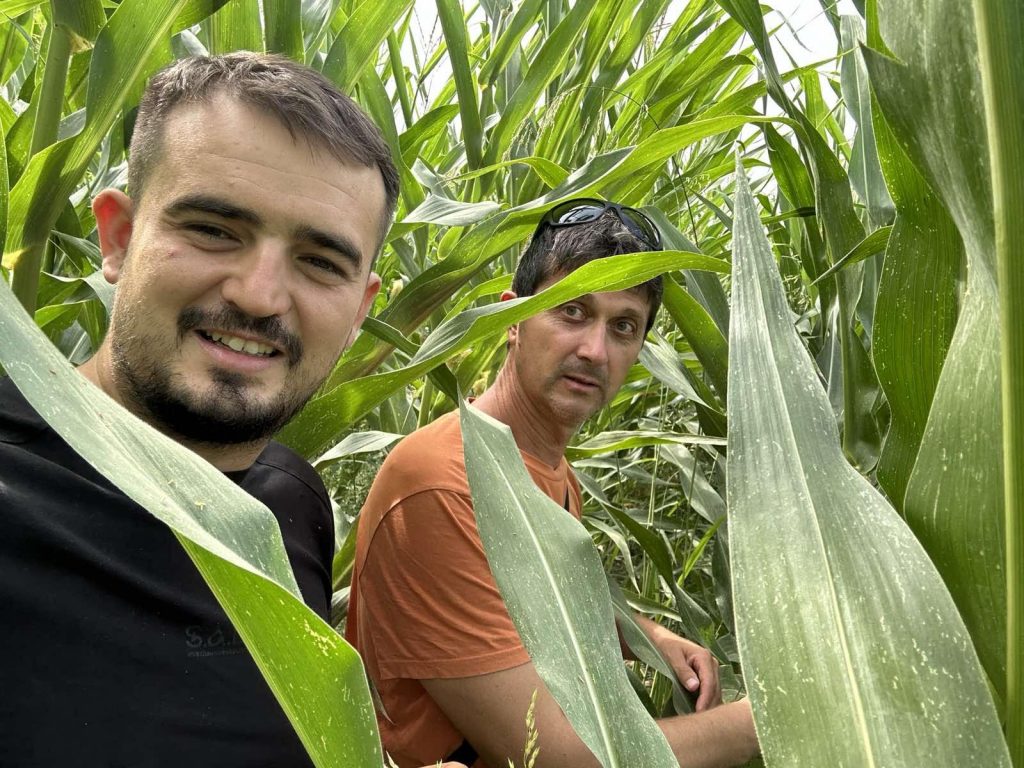Despite what pesticide corporations would like us – citizens, farmers, politicians – to believe, viable alternatives to toxic chemicals do exist and are already happening in farming across Europe. Many farms in conventional agriculture have managed to substantially reduce pesticide use using Integrated Pest Management and agroecological practices, paving the way for a healthier, fairer, more caring and nature-friendly future for agriculture.
Via Pontica, a Bulgarian organisation dedicated to nature protection, met with Aleksandar Sotirov, a young farmer who has embraced agroecological practices for better resilience to climate change, to reduce pesticide use and risk, and promote soil health. What are the benefits of transitioning away from pesticides? The challenges he faced? His vision for good farming in Bulgaria? Read his interview!
- Can you tell us more about your farm and what prompted you to adopt good agroecological practices?

My name is Aleksandar Sotirov and I am 30 years old. Our farm is located in the town of Aytos, cultivating agricultural lands in the surrounding villages. We manage about 6,000 decares, mainly growing wheat, sunflower, barley, rapeseed, and organic apples. In recent years, to align with more economical practices, we also cultivate crops like peas, fava beans, oats, flax, coriander, and others.
The farm was established by my father in 2003. I began actively participating as a child, and since 2015, I have taken on management roles. Over the years, the farm operated as a standard enterprise growing cereal crops until we began to feel the effects of climate change. In 2019-2020, a prolonged drought accompanied by early dry winds destroyed all our crops, leaving us without any yield. This put the farm in severe economic distress and at a crossroads: either shut down or embrace new technologies, innovations, and practices tailored to climate change and environmental preservation. For a young and motivated farmer, supported by my family, the choice was clear. For nearly five years now, we’ve been implementing conservation agriculture methods and practices that reduce pesticide and chemical fertilizer usage.
Agroecology offers an alternative to pesticide-heavy intensive agriculture. Agroecology is a system of food production based on ecological, social and political principles that value healthy and diverse agroecosystems, minimizing external inputs, secure livelihoods for producers, and nutritious food accessible to all.
Working with nature (rather than attempting to constrain it) is one of the basic principles of agroecology. Agroecological practices include crop diversification, planting crops that are adapted to the local environment, crop rotation, using natural preparations, and many other methods to promote beneficial organisms.
Many studies show that switching to diversified agricultural production can help to regulate crop pests while drastically reducing or eliminating pesticides, all without compromising yields.
- What were the main challenges you faced during the transition to good agroecological practices, and how did you overcome them?
The challenges were many. To start, there was little information about conservation agriculture in Bulgaria at the time, let alone practical experience. Fortunately, there were people who lent a helping hand—Assoc. Prof. Dr. Zvezdomir Zhelev from the Agricultural University of Plovdiv and farmer Ivan Balabanov from General Toshevo. They introduced us to the world of conservation agriculture.
Still, the lack of practical experience had its impact, and we continue to tackle issues such as significant weed infestations. It has become even more difficult with the restricted use of glyphosate in recent years. The most significant challenge was the high cost of equipment, especially for a farm already in an economic crisis. European programs for rural development, despite being promoted as supporting young farmers and innovative, environmentally-friendly practices, proved otherwise in reality. While we had already begun implementing genuine good practices, we found that we were not a priority. Thankfully, banks were accommodating, and we managed to secure favorable conditions to replace part of our equipment.
As for technologies to reduce pesticides and fertilizers, the lack of information in Bulgaria played a negative role. These technologies are affordable, easily accessible, and highly beneficial, saving costs in the process. I’m puzzled as to why we didn’t adopt them earlier.

- Which good agroecological practices have you implemented on your farm, and how have they impacted your agricultural operations?
The first practice we adopted was a modern disease and pest forecasting and monitoring system using a weather station and software to process its data. This was first implemented in our apple orchards. Conventionally, apples are treated preventively with chemicals 20-25 times a season to combat diseases and pests. This leads to excessive chemical use and high plant protection costs. The new system allowed us to pinpoint sensitive periods and only treat them when necessary. This opened our eyes to integrated pest management. Armed with this knowledge, we realized we could use fewer sprays and apply biological products at the right time and place for better results. Over the years, this led to the creation of an organic apple orchard with significantly lower costs and equally good yields, if not better quality, compared to conventional orchards.
Not long after, we began applying these technologies to cereal production. Using data from agro-meteorology, soil, and leaf analyses, we could forecast and optimize fertilization. We now know what quantity, type, and timing of fertilizer application are needed to achieve a normal yield, reducing fertilizer costs and nitrate pollution of soil and water.
Another significant practice is conservation agriculture. For five years, we have avoided soil tillage or kept it minimal (up to 5 cm depth only when absolutely necessary). We also produce and sow cover crops, aiming to retain moisture, restore soil potential, and reduce our carbon footprint. This approach reduced costs associated with soil preparation while introducing new challenges. The process is slower, relying on natural processes to benefit us. Despite the hurdles, we are committed to fostering a more sustainable agriculture.
- What has been the effect on yields and product quality after implementing these methods?
In short: normal yields and higher quality produce.

- How has the transition to good agroecological practices affected the environment and biodiversity in your area?
For now, I can’t claim a significant positive environmental impact, as we’ve only been implementing these practices for a few years. Soil restoration, ecosystem recovery, and detoxification from chemicals are long-term processes. However, analyses show increased organic matter in the soil, more beneficial microorganisms, and the reappearance of earthworms and various animals on our fields. While recovery is slow, I believe we are on the right path.
- What changes have you observed in your farm’s costs and profits after adopting these practices?
We’ve noticed significant changes. Conservation agriculture drastically reduced costs for soil preparation, equipment, repairs, and fuel but brought challenges with weed control. While solutions like herbicides exist, they are expensive, and restricted glyphosate use further complicates the issue. Cover crops, essential for this practice, also come with high costs, requiring us to grow and prepare our mixtures to ease financial burdens.
Regarding reduced pesticide and fertilizer use, costs have dropped by over 20%, with no noticeable decline in yields. Overall, farm expenses have decreased while yields remain stable, resulting in profit with a smaller environmental impact.

- How have clients and the market responded to your products grown with good agroecological practices?
Unfortunately, grain markets remain unchanged regardless of production conditions. Prices remain alarmingly low, often forcing us to sell at a loss. For apples sold directly to consumers, the feedback is excellent, with customers praising the taste and health benefits. However, wholesale markets for organic produce also face price limitations, sometimes failing to cover even harvesting costs.
- What motivates you to continue using and developing good agroecological practices on your farm?
I’m motivated by my passion for farming. It’s who I am. Farming in Bulgaria is challenging, especially with climate change and deteriorating market conditions. Without adaptation, survival is impossible. Despite the difficulties, I continue to move forward, learning from risks and mistakes to become a better farmer and steward of the environment.
- What advice would you give to other farmers considering a transition to good agroecological practices?
Don’t fear the unknown. I urge farmers not to wait for disaster to strike before taking action. It’s possible to achieve good yields without poisoning our land.
- What are your future plans for developing and expanding good agroecological practices on your farm?
New methods, technologies, and agricultural practices are constantly emerging. I remain open to anything that can sustain our farm and preserve the soil beneath us. Ultimately, my goal is to become an example of good farming practices—one that others will follow.








